by Lisa Cooke | Apr 10, 2015 | 01 What's New, Records & databases
Every 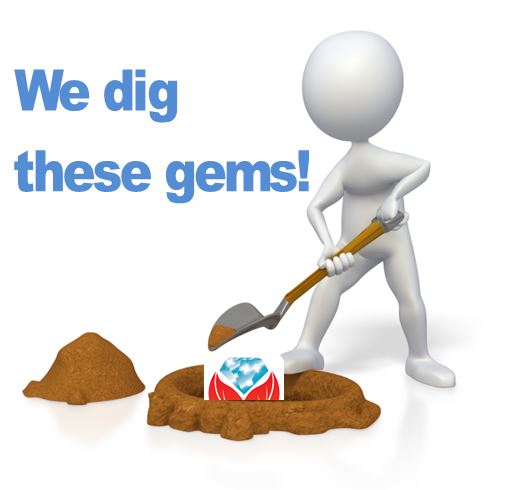 Friday, we post highlights of fabulous new genealogy records online. Scan these weekly posts for content that may include your ancestors. Use these record types to inspire your own search for similar records elsewhere. And always check out our Google tips at the end of each list: they are custom-crafted each week to give YOU one more tool in your genealogy toolbox.
Friday, we post highlights of fabulous new genealogy records online. Scan these weekly posts for content that may include your ancestors. Use these record types to inspire your own search for similar records elsewhere. And always check out our Google tips at the end of each list: they are custom-crafted each week to give YOU one more tool in your genealogy toolbox.
This week we highlight lots of British records and the WWI era:
UK SCHOOL RECORDS. FindMyPast has posted two new datasets on this topic. British School & University Memorial Rolls, 1914-1918 includes over 58,500 students from prominent UK universities who fought in World War I. And nearly 2 million names have been added to the UK National School Admission Registers & Log-Books, 1870-1914. These cover students in England and Wales, 1870 to 1914. FindMyPast says, “Explore their school records to find their birth date, admission year and the school they attended. You may also be able to discover their parents’ names, father’s occupation, exam results and any illnesses that led to absence from school.”
UK TAX RECORDS. About 10 million records and more than a half million images have been added to England, Westminster Rate Books, 1634–1900 at FamilySearch. According to the site, “This collection contains rate books from various parishes in Westminster City from 1634-1900. The rate books were an assessment of tax that was owed and are an excellent census substitute.” The index comes from FindMyPast, where subscribers can also search this collection.
UK WWI SERVICE RECORDS. Over 4 million records have been added to United Kingdom, World War I Service Records, 1914–1920. “This collection contains World War I service records from 1914-1920,” says the collection description. “It contains records from two publications in the National Archives: WO 363 (War Office: Soldiers’ Documents, First World War “Burnt Documents”) and WO 364 (War Office: Documents from Pension Claims, First World War).”
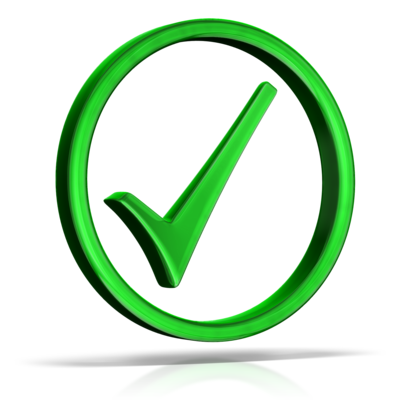
Google owns YouTube, the world’s most popular online video channel. More and more historical footage is being posted on YouTube, from amateur home movies to rare news footage and more. The search box is your best tool for finding footage of events, places and people, including World War I and II events. Conduct a search with the keywords that best describe what you’re looking for. After that initial search, the Filters button will appear: click the down arrow to reveal more search options and options to sort search results. Click here to see rare video footage I found on YouTube that made my jaw drop–it’s my husband’s great-grandfather, his fire truck and his dog.
by Lisa Cooke | Sep 24, 2014 | 01 What's New, Digital Archives, Listeners & Readers, Maps, Norwegian
Recently we heard from Gordon in Billings, Montana, U.S.A, who passed on news about historical Norwegian maps online now at their National Map  Works. He says:
Works. He says:
“I have been enjoying your podcasts for a couple of years now, so I though I would pass on a piece of information that some of your listeners might want to hear about.
I don’t know how many of them do research in Norway like I do but I suspect that most of the ones that do, do not make a habit of reading the Norwegian newspapers. Since my wife was born in Norway, we do read her hometown paper on a regular basis. Just yesterday, that paper, Bergens Tidende, had an article reporting that the “Statens Kartverk” (the National Map Works) has recently digitized and posted on-line 8000 historical maps of Norway. (Click here for the article.)
Unfortunately, the website for the maps has not put a link in their English section yet, but there isn’t much to read beyond place names on the maps anyway. You can view the maps here.
Just choose a county, click the green button, and see a wonderful collection of maps for anyone with ancestors from Norway.”
Thanks for the tip, Gordon! I’ll add this tip of my own: Open the website in Chrome and Chrome will automatically offer to translate the website. Simply click the Translate button, like you’ll see below:
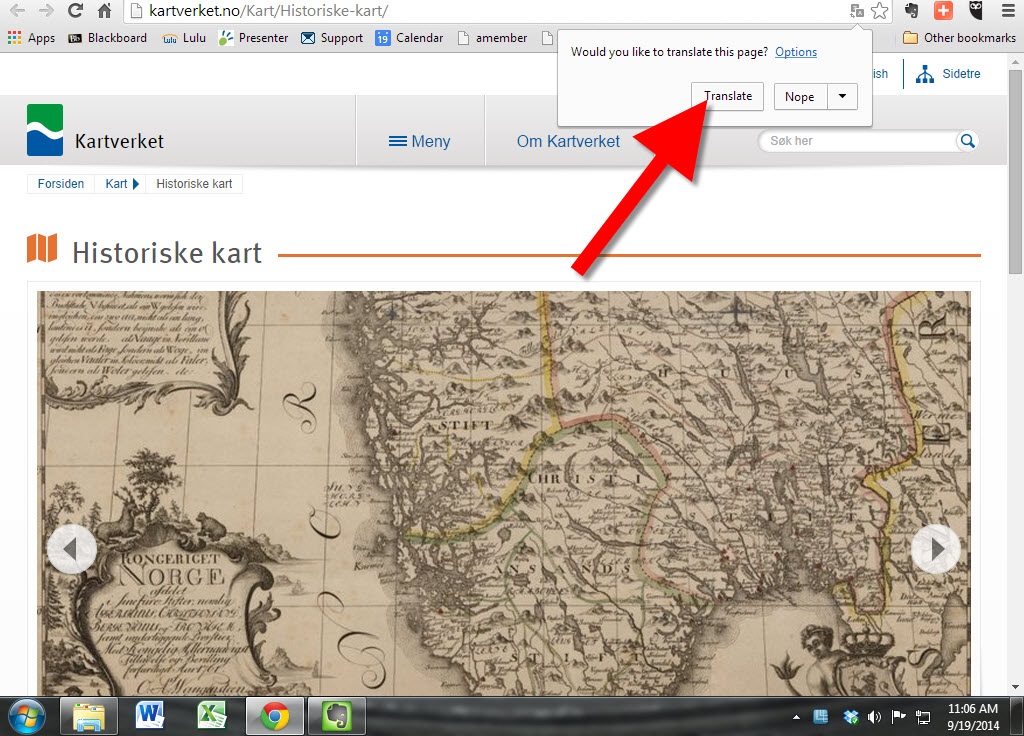
by Lisa Cooke | May 24, 2014 | 01 What's New, Inspiration, Records & databases
 A new Genealogists’ Declaration of Rights was announced before a crowd of more than 2,500 genealogists at the NGS 2014 Family History Conference in Richmond, Virginia recently. Jordan Jones, President of the National Genealogical Society (NGS), a sponsoring member of the Records Preservation and Access Committee (RPAC).
A new Genealogists’ Declaration of Rights was announced before a crowd of more than 2,500 genealogists at the NGS 2014 Family History Conference in Richmond, Virginia recently. Jordan Jones, President of the National Genealogical Society (NGS), a sponsoring member of the Records Preservation and Access Committee (RPAC).
According to the NGS Press Release, “The Declaration of Rights is a statement advocating open access to federal, state, and local public records. The Declaration affirms America’s long history of open public records, which has been threatened the last few years over concerns about identity theft and privacy. The Records Preservation and Access Committee has worked with state and federal legislators as well as local public officials for more than twenty years in support of legislation and regulations that achieve a balance between access and privacy. The Declaration of Rights has been approved by the board of directors of the three sponsoring organizations: The National Genealogical Society (NGS), the Federation of Genealogical Societies (FGS), and the International Association of Jewish Genealogical Societies (IAJGS).”
Genealogists from all over the U.S. signed the Declaration at NGS, and will continue to do so in the coming months at the IAJGS Conference on Jewish Genealogy in Salt Lake City, Utah (27 July–1 August) and the Federation of Genealogical Societies Conference in San Antonio, Texas (27–30 August). You can click here to sign it electronically if you would like to (though you can’t do it in person.)
The press release further states, “Genealogists advocate the right of access to records held by government agencies including but not limited to vital records (births, marriages, deaths, divorces); land conveyances and mortgages; tax assessments; guardianships; probates of estates; criminal proceedings; suits of law and equity; immigration; military service and pensions; and acts of governmental entities. Genealogists further advocate that they need to be allowed access to original records when photocopies, microfilm, digital images, or other formats are insufficient to establish clear text, context, or completeness of the record. The rights of genealogists specified in the Declaration object to numerous barriers created to deny them access to records.
“Thousands of professional genealogists do research every day on behalf of clients, government agencies, and attorneys. Of particular note are the many forensic genealogists who assist the Department of Defense in locating heirs for the repatriation of remains from previous wars; assist county coroners in the identification of unclaimed persons; work with attorneys in locating missing and unknown heirs involving estates, trusts, real estate quiet title actions, oil and gas and mineral rights, and other similar legal transactions; trace and track heritable medical conditions where finding distant cousins can facilitate early treatment and possibly prevent a premature death; research stolen art and artifacts for repatriation; and identify American Indians, Native Alaskans, and Native Hawaiians to determine eligibility for tribal benefits.”
by Lisa Cooke | Oct 11, 2017 | 01 What's New, Archive Lady, Archives
New archival collections at your favorite repository may be the long-awaited key to solving your family history mysteries! But how can you keep up with what’s new at archives and libraries? Professional archivist Melissa Barker shares her favorite tips.
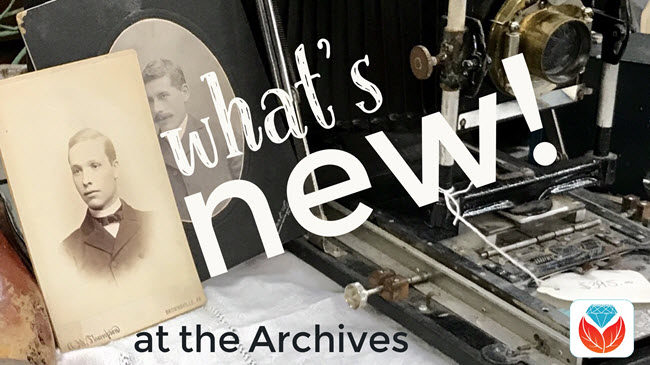
Not long ago, Lisa Louise Cooke read my article on what’s new at the Utah State Archives. She asked me how I keep up with new archival collections at my favorite repositories.
New Archival Collections May Be Just What We Need
Many of us can say that our ancestors were living in a certain area and their records should be located at certain local archives, libraries, or genealogical or historical societies. Maybe we have even done research there in the past, either by visiting the facility, contacting them by phone or email, or using their records online. Records, photographs, ephemera, and artifacts are constantly being discovered and made available in all of our wonderful archives. Many of these records may not make it to microfilm or online, but they are so rich with family information. (Don’t know where to look? Click here to learn how to find archives and libraries near your ancestor’s locale.)
But trying to keep up with all the new records that are being processed in archives, libraries, and genealogical societies can make your head spin! So how are genealogists supposed to stay current?
3 Ways to Keep Up with New Archival Collections
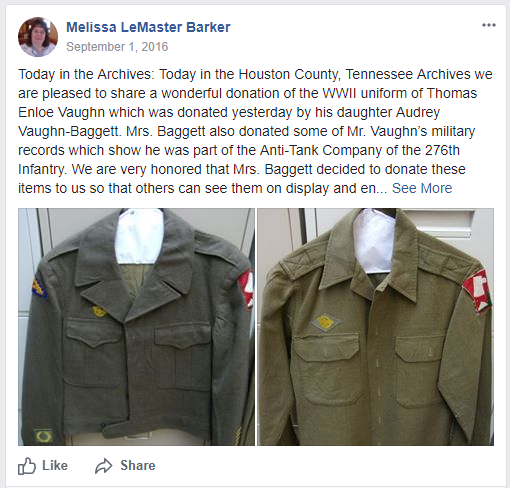 1. Check the archives website. See if they have announced new records collections that are available for research (many archives do). The archives may even have a blog or newsletter that you can subscribe to, which will give you the latest news right at your fingertips. Not only will the archives announce new records that are available but they will even let their patrons know what has been recently donated to the archives and which records are currently being processed.
1. Check the archives website. See if they have announced new records collections that are available for research (many archives do). The archives may even have a blog or newsletter that you can subscribe to, which will give you the latest news right at your fingertips. Not only will the archives announce new records that are available but they will even let their patrons know what has been recently donated to the archives and which records are currently being processed.
2. See if the archive has a social media presence. Archives like to post photos of new discoveries and records collections that are ready for the researcher. I know at the Houston County, TN. Archives I like to scan and post images of great documents or artifacts to Facebook, Twitter, Instagram, and Pinterest. (Like the post pictured here that I shared recently.)
LISA’S TIP: Remember to use Google search terms to find your favorite archive’s website and social media homes! A quick search such as National Archives Pinterest might be faster than trying to find it on the actual social media site. That search brings up tempting boards for National Archives in both the US and the UK:
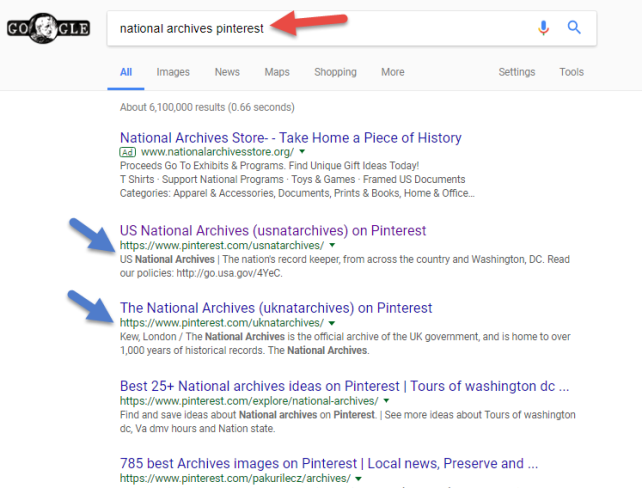
3. When visiting an archive, ask: “What’s new?” Talk to archivists about records collections that have recently been processed and made available for research. This is a great way to find more information and records about your ancestors. As an archivist who processes records on a daily basis that are not online or even microfilmed, I get excited about sharing what I find with the genealogy community.
Until next time, this is The Archive Lady, remember it’s not all online, so contact or visit an archive today!
Learn More about Using Archival Collections
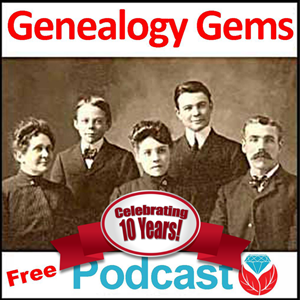 Listen to me on the free Genealogy Gems Podcast! This year the podcast is celebrating its 10th-year anniversary. Tune in to hear more inspiring stories and tips to help your family history research. Listen on your computer or on your mobile device through the Genealogy Gems app. Click here to learn more.
Listen to me on the free Genealogy Gems Podcast! This year the podcast is celebrating its 10th-year anniversary. Tune in to hear more inspiring stories and tips to help your family history research. Listen on your computer or on your mobile device through the Genealogy Gems app. Click here to learn more.
by Lisa Cooke | Jul 29, 2013 | 01 What's New, Conferences, DNA, Inspiration, NARA
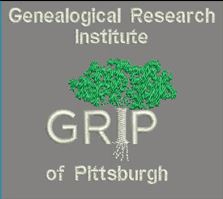 Hello from Genealogy Gems Contributing Editor Sunny McClellan Morton. I’m still flying high after a week just spent at GRIP, the Genealogical Research Institute of Pittsburgh. This was like mini-graduate school for genealogists, complete with a lush green campus in the rolling hills of Pennsylvania; immediate access to legendary instructors; rigorous coursework that’s exactly what I want to learn; a great genealogy bookstore; and plenty of after-hours socializing.
Hello from Genealogy Gems Contributing Editor Sunny McClellan Morton. I’m still flying high after a week just spent at GRIP, the Genealogical Research Institute of Pittsburgh. This was like mini-graduate school for genealogists, complete with a lush green campus in the rolling hills of Pennsylvania; immediate access to legendary instructors; rigorous coursework that’s exactly what I want to learn; a great genealogy bookstore; and plenty of after-hours socializing.
While I was there, GRIP announced an exciting lineup for 2014 (it’s not even on their website yet). Here are the topics and instructors:
- Finding and Documenting African-American Families with J. Mark Lowe, CG, and Deborah Abbott, PhD.
- Practical Genetic Genealogy with Debbie Parker Wayne, CG, CGL, CeCe Moore and Blaine Bettinger, PhD, JD.
- Law School for Genealogists with Judy G. Russell, JD, CG, CGL and Richard G. “Rick” Sayre, CG, CGL.
- Becoming an Online Expert: Mastering Search Engines and Digital Archives with D. Joshua Taylor, MA, MLS.
- Determining Kinship Reliably with the Genealogical Proof Standard with Thomas W. Jones, PhD.
- Intermediate Genealogy: Tools for Digging Deeper with Paula Stuart-Warren, CG, FMGS, FUGA.
All those initials after these instructors’ names means tons of expertise is poured into every GRIP experience, and if you know any of these folks you know there’s not a “boring professor” among them!
If you’re ready for seriously advanced genealogy education, check out GRIP or other learning experiences like it. In the United States, I know about SLIG in Salt Lake City, IGHR at Samford University in Birmingham, and NIGR at the National Archives. There are also more flexible (but still demanding) options like ProGen Study Groups, Boston University’s Genealogical Research Programs and the National Genealogical Society’s American Genealogy Home Study course.
Don’t forget to check out programs and conferences offered by your own state, regional and local genealogical societies. They usually offer a variety of topics for beginners to more advanced students–and they’ll be closer to home and less expensive. Our own Genealogy Gems premium memberships offers a fabulous genealogy education for a fabulous price: in addition to premium podcast episodes, you also get a new, full-length video tutorial every MONTH to watch whenever you like, along with unlimited access to all previous full-length video tutorials. Check out our list of Premium Videos here.
 Friday, we post highlights of fabulous new genealogy records online. Scan these weekly posts for content that may include your ancestors. Use these record types to inspire your own search for similar records elsewhere. And always check out our Google tips at the end of each list: they are custom-crafted each week to give YOU one more tool in your genealogy toolbox.
Friday, we post highlights of fabulous new genealogy records online. Scan these weekly posts for content that may include your ancestors. Use these record types to inspire your own search for similar records elsewhere. And always check out our Google tips at the end of each list: they are custom-crafted each week to give YOU one more tool in your genealogy toolbox.

 Works. He says:
Works. He says:


 1. Check the archives website. See if they have announced new records collections that are available for research (many archives do). The archives may even have a blog or newsletter that you can subscribe to, which will give you the latest news right at your fingertips. Not only will the archives announce new records that are available but they will even let their patrons know what has been recently donated to the archives and which records are currently being processed.
1. Check the archives website. See if they have announced new records collections that are available for research (many archives do). The archives may even have a blog or newsletter that you can subscribe to, which will give you the latest news right at your fingertips. Not only will the archives announce new records that are available but they will even let their patrons know what has been recently donated to the archives and which records are currently being processed.

